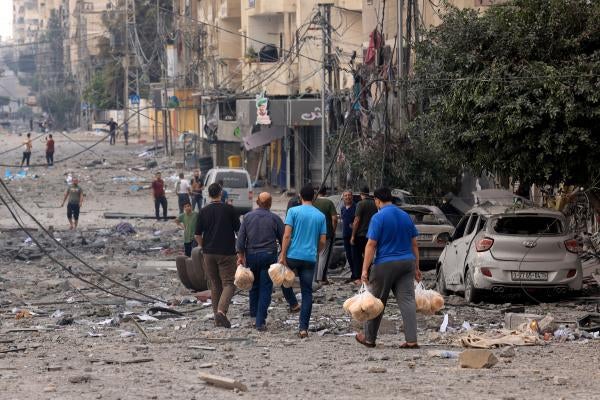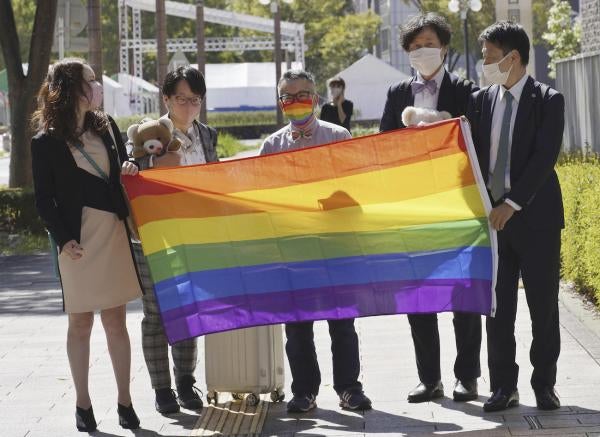Lire la version en français / Lea la versión en español
While Andrew is away this week, different members of the Daily Brief team will take over and keep you informed about the latest human rights news. Today's edition is authored by Birgit Schwarz.
It probably feels to many like we have suddenly been plunged into a new age of conflict. Whether in Ukraine, Sudan or Israel-Palestine, the conflicts that have recently erupted around us seem to be fought with increasing brutality and disrespect for the rules of war.
When power stations, dams, hospitals and densely populated areas are being bombarded, when festivals and homesteads are raided, it’s civilians who pay the price. Those lucky enough to survive are often left injured, homeless and traumatized.
Civilians, let alone children, should never be the target of attacks or the pawns in a conflict. This is as much true for the wars in Ukraine and Sudan as it is for the most recent flare-up in Israel-Palestine. It’s one of the basic imperatives of the rules of war, also known as international humanitarian law: that parties to a conflict must distinguish at all times between combatants and civilians.
Adopted in 1949, following the horrors of World War II, the Geneva Conventions set out what can and cannot be done during an armed conflict. Their goal is to limit suffering. They are universal. They are, as Human Rights Watch’s former head Ken Roth wrote in a recent op-ed for The Guardian, “not meant as a nice thing to do except when the going gets rough; they are requirements even in the most extreme circumstances, when a nation is at war, when its people are slaughtered.” And they are not contingent on reciprocity. If one side commits war crimes, that does not mean that the other side can do the same. No matter how justified the anger and how understandable the urge for revenge.
Hence, the Hamas-led deliberate and gruesome mass killing of Israeli teenagers at a festival in southern Israel and other civilians nearby, its taking civilians hostage as pawns, and even threatening to execute their captives does by no means justify the Israeli government committing its own war crimes. Cutting off water, fuel, and electricity to the 2.2 million people who live in Gaza, amounts to collective punishment, a war crime. And as my colleague Sari Bashi told the New Yorker in a recent interview with Isaac Chotiner, “the terrible, terrible deaths and injuries and destruction of homes and schools and clinics in Gaza is an indication that they have not been following the laws of war.” Israel is, in other words, retaliating for war crimes by committing its own. And whoever turns out to be responsible for yesterday’s strike on al-Ahli hospital, also known as al-Moamadani, in central Gaza that killed several hundred people should be held to account, as this was a war crime, too.
Israel and Hamas are not the only culprits who have been flouting the rules of war in recent conflicts. Human Rights Watch has documented numerous war crimes committed in Ukraine – mostly by Russian forces. And in Sudan both sides to the conflict are guilty of targeting civilians. So far, almost no one has been arrested or jailed for these atrocities or prosecuted at the International Criminal Court or ad hoc UN tribunals. With those in charge of policing the rules of war often split along partisan lines, enforcement has been difficult. This has undermined accountability and created a sense amongst violators that they can act with impunity.
And so it goes: Those feeling wronged respond by wronging those they feel wronged by, flouting basic principles of human decency and protections of civilians on all sides. And the cycle of violence not only continues, it escalates.
This, my colleague Sari Bashi told the New Yorker, should not be the response, no matter how justified the anger and how deep the pain may be. “It shouldn’t be this difficult to say that, but it is”, she said. “And I guess I would encourage people to think about whether the “They’re worse than we are” argument is particularly constructive or morally sound.”
In responding to the unspeakable crimes of Hamas, Israel should abide by the laws of war—not only to comply with international legal obligations—but also for moral and strategic reasons. As my colleague Sarah Yager points out in an op-ed in Foreign Policy: “What happens now in Gaza will determine Israel’s credibility on the world stage.”







